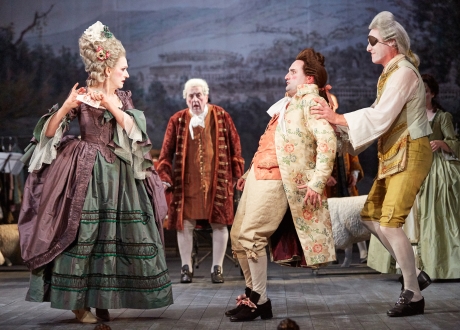
This co-production with the Liverpool Everyman and the Glasgow Citizens Theatre (whose artistic director, Dominic Hill takes the helm) was chosen in part for its chronological attachment to The Old Vic (Née Royal). However there is nothing precious in Mr Hill’s production and its attachment to the eighteenth century is almost ‘in passing’, as is the impressionistic set of Tom Rogers. The overall effect is of the action taking place backstage in a theatre – this theatre (whichever on the night). The arrangement accommodates a certain freedom which allows anachronistic detail to be amusing without being intrusive.
A play which owes as much to Menander’s Dyskolos (via Roman copies) as well as the author’s own eventful twenty three years and (unsurprisingly in a first play) a bagful of other influences, whilst mixing comedy of manners with comedy of humours, nonetheless manages to show something of the talent of the new kid on the block as he puts his own spin on the age old problem of the course of true love and the impediments thereto.
It’s fitting that in a play that pits the generations the one against the other much of the delight comes from the older characters. Julie Legrand as Mrs Malaprop has resisted the temptation to play the character as a perfumed dolt in favour of something much subtler; an intelligent, refined woman of mature years whose intellectual cheques are not quite backed up by a lexical account and whose taste for amours is no less dull from her lack of youth. Her movement, which has the precision of a dancer, perfectly articulates the imprecision of her thought and the stage is more animated by her presence. Her face and demeanour were a perfect picture as it dawned on her as to the true author of a less than flattering letter.
Providing the bulky flint from which others spark, Desmond Barrit’s, Sir Anthony, gloriously rings the changes between irascible, Lear-like father, prepared to disinherit his son in a fit of ill-temper and sly old dog for whom the joys and politics of love are not a completely faded memory.
In Lydia Languish, Lucy Briggs-Owen gives us a familiar TV caricature – though no less entertaining for that – of an overwrought Chelsea type; wilful, independent minded, volatile and contrary. The result is a singular creation the marvel of which being that the modern seeming character appears at home in the preposterous wig and voluminous dress. We feel the slightly laddish Jack Absolute (Rhys Rusbatch) has more than met his match.
Dominic Hill has given us a modern-feeling production of a period comedy without any sense of it being disjointed or ill-used. The strong company get laughs where there ought to be laughs with leading comic performances that will remain long in the memory. A production worthy of its place in the 250th anniversary celebrations. ★★★★☆ Graham Wyles 16th September 2016

